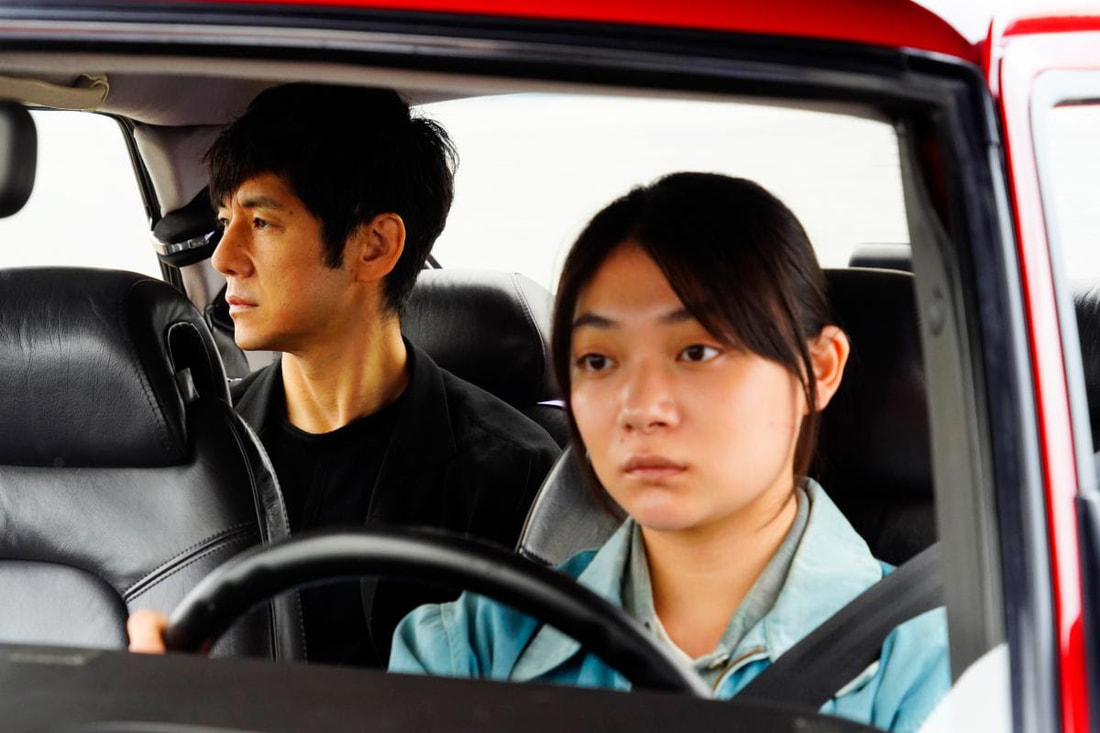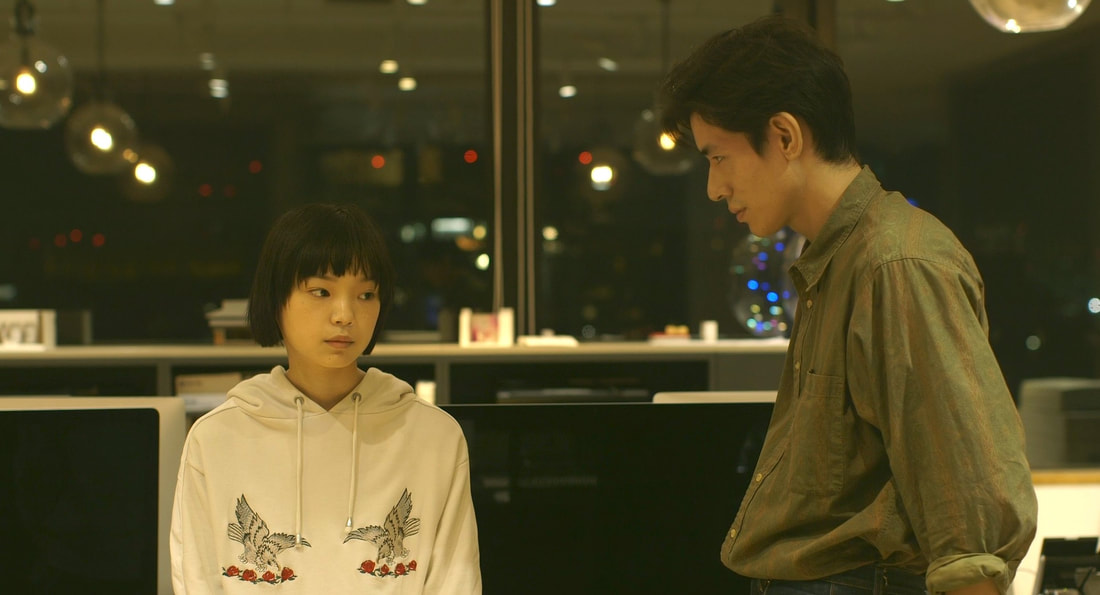Ryusuke Hamaguchi Talks His 2021 Double Bill DRIVE MY CAR and WHEEL OF FORTUNE AND FANTASY10/3/2021
Interview by Sean Boelman
Japanese filmmaker Ryusuke Hamaguchi is having quite the year, with two films having toured nearly the entirety of the festival circuit. The first, Wheel of Fortune and Fantasy, debuted at Berlinale and is an anthology drama centering around the idea of coincidences in relationships. The other, Drive My Car, is adapted from a short story by Haruki Murakami and won the best screenplay prize at Cannes. They are two very different but both wonderful films, and we had the pleasure of talking with the director about them. Check out our interview below!
On Drive My Car
disappointment media: What stood out to you about Murakami's writing and this story in particular
Ryusuke Hamaguchi: I can say there are mainly three things. The first one being that there are conversations that are happening inside a car. And I think this is related to the appeal of the characters themselves. These characters often are very internalized in their feelings. But through their conversations, through the time spent in the car, they start to get closer to each other. And I felt that this kind of relationship and the depiction of the relationship makes it easier to turn and adapt into a film. The second reason is a conflict with the character being an actor. And you know acting and performance is a theme that I've always dealt with in a lot of my films, so I felt very attracted to it. The third is the text, the dialogue that Takatsuki has in the original in which he says that in order to know oneself better, you need to face the other person directly. And that text from the original was something that personally moved me and I felt very convinced by that story and to me it was one of the cores of the story and I wanted to directly include it in my film. disappointment: Even though the film is based on a short story the runtime is nearly three hours How did you find so much depth and detail in the source material? Hamaguchi: So I think the answer to that question is related again to the characters which are Kafuku and Misaki. I really like both of these characters that are in the original. They're both characters who don't often make their emotions apparent. However, when they do say something about their emotions, it's very honest. And that's something that really struck me about the original. However, in the original story, I felt that where these two characters end up at the end of the story felt incomplete. I wanted to see where they actually do end up. And so when I was thinking about trying to get them to a certain destination, a certain place that felt more complete, it just ended up taking this long. disappointment: So one of the highlights of Drive My Car is the cast. How did you work with the actors to deliver such emotional performances? Hamaguchi: I think one major thing here is to choose the right cast to begin with. The performers who played the main characters, Mr. Nishijima and Miss Miura, both of them are wonderful actors. And it was also very delightful to be able to work with wonderful actors who also fit the side characters. I felt that something about the humanity that these casts brought to the character connected a lot with what I was trying to depict. And I think they all personally just gave depth to the characters to begin with. So you know, once I know that I'm working with a wonderful cast, my job I believe is to create an environment where they can all feel safe to perform, I see that as my number one job so that the performers can bring their best. And if I can actually provide that kind of environment, I know that my cast, the performers will do a wonderful job. And in order to create that I tried to have as much time to rehearse. And I believe one of the most important fears or worries that an actor can have is not knowing enough about the characters. And that creates a lot of worry. And so in order to try to get rid of that worry, the two things that I do are readings, but also giving backstory. So in terms of the reading, what we do is we have the actors read the dialogue, the script many times over and over and over without emotion until we get to the point where the dialogue comes out automatically. And once the actors are able to do that, when they're actually performing in front of the camera, they can really look at each other and it makes it easier for them to show emotion and think about other things. And regarding my point about backstory, it's so that I can give past relationships to the characters that are present. What I do is write a very simple script about the backstory. And even though in rehearsals we're just doing the script reading, what we sometimes do is to act out those backstory scripts. And what that allows is to give the roles sort of a memory through that relationship that was caused through those rehearsals of doing the backstories and that way, when they actually are on set and doing the main script, even though they had been reading that dialogue without emotions previously, once they're in front of the camera, they can sort of derive a natural emotion because they have this past memory from acting out the backstory. And I think that allows for a real emotional performance to come through. On Wheel of Fortune and Fantasy
disappointment: What was the challenge of creating a film out of three thematically connected stories?
Hamaguchi: So I would say making these three short stories was actually a rather smooth process. If I were to talk about some challenges, I mean obviously there are challenges to making any film, but the thing about Wheel of Fortune and Fantasy is that each production of each story was at a very small scale. And to be working at a small scale meant that it allows for the safety to spend a lot of time to make the film. Which for me also meant that there is more time to rehearse, and so with Wheel of Fortune and Fantasy, this isn't necessarily a challenge but what it allowed me to do was to test out what it can mean to have more time to rehearse. disappointment: So Wheel of Fortune and Fantasy has a humor to it. Why do you think this was important for this film? Hamaguchi: I'm really grateful that you mentioned humor in my films, mainly because I'm always thinking about humor to be part of my films. But I think the fact that the theme of Wheel of Fortune and Fantasy is coincidence really allows and makes room for humor to enter the work. Working with this idea of coincidence is a really strange existence within this framework of storytelling, mainly because coincidence itself exists outside of the logic of cause and effect, in some ways, is this very alien thing that is suddenly appearing into the story. And it has the power and the ability to change where the direction of the story is going. It can suddenly swerve the direction of the story. And I think that can actually lead to humor in itself. But when working with coincidences, I think it's not possible to just do that, because I feel like it's more because then the audience to the audience coincidences can be a reason for something to seem quite unbelievable. However, the Japanese title of this film is directly translated to be "Coincidence and Imagination". And so I had the title include coincidence, and I think that allows for the audience to be more open and accepting of the fact that coincidences will happen in the story. And again, I think this really also leads to a humorous element. disappointment: So the second episode discusses the idea of story structure which is something that the film as a whole experiments with. Why do you like subverting expectations for storytelling? Hamaguchi: Doing this where I have three different stories but then turning it into one film was a challenge in itself but also joyous at the same time. And I thought it was okay to have three very different stories, but I did want people to also come out of the theater feeling that they watched one film. So in that sense, I was very aware about the structure of the film in its entirety. In terms of the first story, I kind of saw it as an entry point. So the first story has a very understandable, very simple triangular relationship structure that's there. I would say maybe the end of the first story is the most ambiguous out of the three. That said, with the second and third stories, I was sort of pushing on the idea of testing out this idea of coincidence further in both the second and the third film, Regarding the second film, coincidence ends up bringing on a very bad result for the characters on the in the third film, however, the coincidence leads to a happy incident, happy feelings. And so if I had flipped that order of what you come out of with the two stories, I felt that the audience would be coming out of the theater feeling quite disgruntled. And I really wanted the audience to come out of the film feeling something happy.
Drive My Car and Wheel of Fortune and Fantasy are screening at the 2021 New York Film Festival. Wheel of Fortune and Fantasy opens in theaters on October 15 and Drive My Car opens in theaters on November 24.
0 Comments
Leave a Reply. |
Archives
March 2024
Authors
All
|
|
|
disappointment media
Dedicated to unique and diverse perspectives on cinema! |


